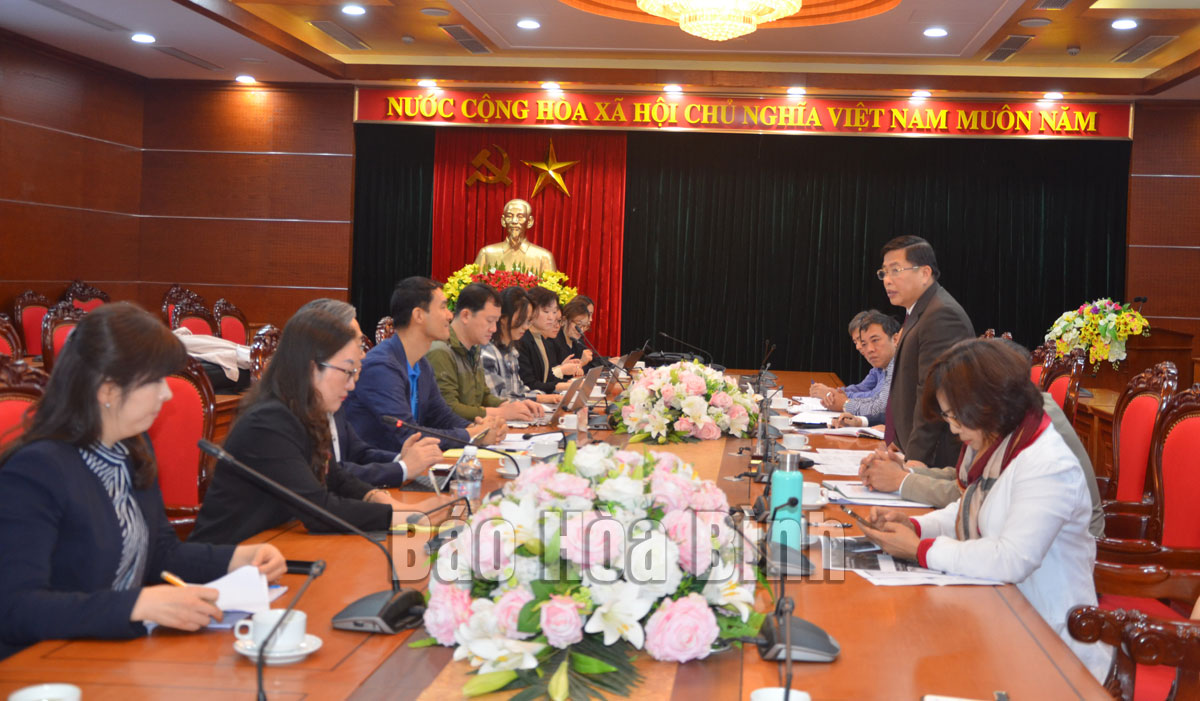
(HBO) - A delegation from the Korea International Cooperation Agency (KOICA) led by Director General of KOICA's Department of Corporate Partnership Lee Sang-back had a working session with the provincial People's Committee on a public-private partnership project on reducing emissions from deforestation and forest degradation in developing countries (REDD+) on March 29. It was received by Dinh Cong Su, Vice Chairman of the provincial People's Committee, and representatives from local departments and sectors.
Dinh Cong Su, Vice Chairman of the
provincial People's Committee, speaks at the working session.
KOICA was established by the Korean government
in 1991 with the mission of implementing non-refundable aid programmes for
developing countries, including Vietnam. Every year, KOICA receives more than 1
trillion KRW from the Korean government to support its partner countries.
Apart from the financial support, through KOICA,
the Korean government has shared its experience in the fields of education,
healthcare, public administration, rural development, information technology,
industry and energy, environment, climate change response, and the Sustainable
Development Goals. It also provided expertise in disaster response and
reconstruction.
The above-said PPP project - a technical
assistance one – aims to provide a forest management and monitoring system
based on information-technology and a carbon trading platform.
Specifically, the project applies technological
solutions such as satellite imagery, remote-sensing technology, and machine
learning to accurately estimate the amount of carbon credits and reduce
wildfires and landslides through warning and quick response using AI-based
sensors and an automatic irrigation system in order to manage forests
effectively.
The project is expected to be rolled out in 15
cities and provinces with a total forest area of 5.6 million hectares,
including 1.5 million hectares in hotspots of deforestation and forest
degradation.
KOICA expects Hoa Binh to be the first province
to participate in the project, which features four main activities: reducing
emissions from deforestation and forest degradation, absorbing carbon from
afforestation and reforestation, restoring and protecting natural forests, and
enhancing livelihoods for ethnic minorities.
At the working session, the participants
discussed procedures, advantages, difficulties in the project implementation,
and mechanisms and policies to attract investment in the local forestry sector.
In his remarks, Su expressed his pleasure at
KOICA’s selection of Hoa Binh for the project on reducing emissions from
deforestation and forest degradation, which is also the locality’s strength.
Hoa Binh wishes to continue joining hands with
KOICA in the project implementation, he said/.
In Lac Thuy district, communes have been succeeded in promoting their One Commune-One Product (OCOP) products while others are still struggling to position their typical farming products in market. Some communes in the district still fail to have their products met OCOP programme’s requirements, while others have seen their certifications expired.
The inspectorate agency of Hoa Binh province has issued Official Dispatch No. 1090/TTr-PCTN to provincial departments, agencies, localities, business associations, enterprises, and investors regarding measures to improve informal component indexes of the Provincial Competitiveness Index (PCI).
Hoa Binh is taking concrete steps to improve its investment environment, with a strong focus on supporting businesses, settling obstacles for strategic investors, and creating opportunities for robust development in the coming years.
Under the blazing early summer sun, the construction site of Nhuan Trach Industrial Park (IP) in Luong Son district is abuzz with activities from dawn to dusk, a testament to the determination of the investor to meet their construction targets on schedule.



